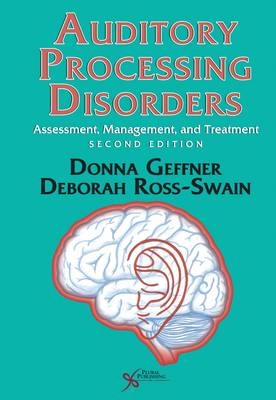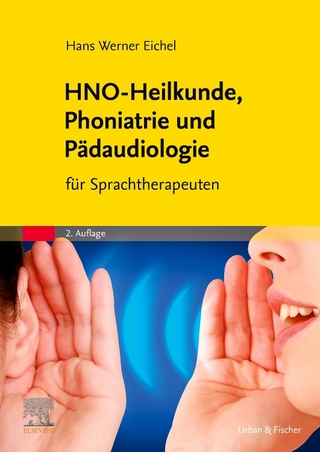
Auditory Processing Disorders
Plural Publishing Inc (Verlag)
978-1-59756-495-3 (ISBN)
- Titel ist leider vergriffen;
keine Neuauflage - Artikel merken
The second edition of Auditory Processing Disorders, which includes several new chapters, details the history, definition, behaviors, and co-morbidity of auditory processing disorders before educating the reader on the most current practices for audiological and speech-language assessment of APD, including its impact on literacy and language processing. Practical rehabilitation and management strategies are covered in detail. This book a highly practical book designed specifically for practicing clinicians, both audiologists and speech-language pathologists. The book includes authors that read like a "Who's Who" in the discipline of auditory processing disorders (APD). "'New to this edition: New chapter by Frank Musiek, Gail Chermak, Teri Bellis and Jeff Weihling on the philosophical and conceptual existence of APD, defying the myth.New chapter on Computer-Based Training Methods for Age-Related APD: Past, Present, and Future by Harry Levitt, Chris Oden, Helen Simon, Carla Noack and Al Lotze New information from Nina Kraus and associates from the Northwestern Brain Volts lab on the value of using cABR in the diagnosis and measurement of APD in children, as well as a chapter on the effectiveness of musical training to alter that brain's engagement with sound.
New chapter by Bunnie Schuler on the use of apps in hand-held devices for treatment. New chapter on case law from one of the nation's leading attorneys in special education, Gary Mayerson. Updated information on the use of computer-based software programs from Larry Metwedsky. New chapter by Leah Light on APD as a Model of a Functional Disconnection Syndrome. Three new appendices: Tips for Parents, Tips for Teachers, and a Study Questions Answer Key
Donna Geffner is the Director of the Graduate Programs in Speech-Language Pathology and Audiology and the Speech and Hearing Center at St. Johns Unversity-Queens, New York. She initiated and developed both the undergraduate and graduate programs and the Speech and Hearing Center. Now, she has completed a new consortia AuD program with Adelphi and Hofstra Universities. She is dually certified and maintains a private practice working with children and adults with auditory processing problems and attention deficit/hyperactivity disorders. She is the recipient of several local and state association honors, and was an ASHA president, and Vice President for Academic Affairs. Her recent book What Professionals Need to Know About AD/HD was published by Thinking Publications in 2005, accompanied by a CD of her clients and families. Her Listening Inventory was Published by Academic Therapies.Dr. Geffner was also awarded an Honorary Doctorate from Providence College in 2004. Dr. Deborah Ross-Swain is the founder, owner and clinical director of The Swain Center for Listening, Communicating and Learning, The Listening Center in Walnut Creek and Fountain Valley California. Dr. Swain is the former Chief of Speech-Language Pathology at the University of California, Davis Medical Center and held a clinical staff faculty appointment to the School of Medicine. She is the Past President of California Speech Pathologists and Audiologists in Private Practice (CALSPAPP) and served on California Speech-Language and Hearing Association (CSHA) Task Force for developing Guidelines for (Central) Auditory Processing Disorders and Encroachment. Dr. Swain has received awards from CSHA for Outstanding Service and Outstanding Achievement. She serves as a California delegate to the Legislative Council for the American Speech-Language and Hearing Association (ASHA). She is the author of numerous standardized test batteries and treatment manuals: The Listening Inventory; The Ross Information Processing Assessment-2; The Ross Information Processing Assessment-Geriatric; The Ross Information Processing Assessment-Primary; The Bedside Evaluation and Screen Test and The Swallowing Ability and Function Test; Aphasia Rehabilitation: An Auditory and Verbal Treatment Hierarchy; Aphasia Rehabilitation: A Reading and Writing treatment Hierarchy; The Cognitive Linguistic Improvement Program; The Voice Advantage; The Geriatric Treatment Manual and The Geriatric Resource Manual. Dr. Swain is married and the mother of four children.
FOREWORD by Charles I. Berlin, PhD PREFEACE CONTRIBUTORS SECTION I. IDENTIFICATION AND ASSESSMENT 1. Current Issues in the Diagnosis and Treatment of CAPD in Children Jeffrey Weihing, Teri James Bellis, Gail D. Chermak, and Frank Musiek 2. History of Auditory Processing Disorders in Children Jay R. Lucker 3. Central Auditory Processing Disorders: Definition, Description and Behaviors Donna Geffner 4. Disorders and Deficits that Co-Occur or Look Like APD Yvette N. Tazeau and Patricia McAleer Hamaguchi 5. Audiologic Assessment of (C)APD Marni Johnson Martin, Cassandra R. Billiet, and Teri James Bellis 6. SCAN-3 An Evidence Based Diagnostic Test Battery for Auditory Processing Disorders Robert W. Keith and Rola Farah 7. cABR: A Biological Probe of Auditory Processing Nina Kraus and Jane Hornickel 8. Auditory Processing in Individuals with Auditory Neuropathy Spectrum Disorder Gary Rance 9. Differentiating ANSD from CAPD Thierry Morlet, L. Ashleigh Greenwood, and Charles I. Berlin 10. Temporal Processing in the Auditory System Vishakha Waman Rawool 11. The Speech-Language Pathologist's Role in the Assessment of Auditory Processing Skills Deborah Ross-Swain 12. Language Processing versus Auditory Processing Gail J. Richard 13. Auditory Processing Disorders and Literacy Martha S. Burns 14. APD as a Model of a Functional Disconnection Syndrome Leah Light SECTION II. MANAGEMENT 15. The ABCs of CAP: Practical Strategies for Enhancing Central Auditory Processing and Related Skills Jeanne M. Ferre 16. Management Strategies Donna Geffner 17. Challenges and Strategies for Parenting the Child with Auditory Processing Disorder Dorothy A. Kelly SECTION III. EVIDENCE BASED TREATMENT AND INTERVENTION 18. Phonemic Training and Phonemic Synthesis Programs Jack Katz 19. Metacognitive Therapy Approaches Patricia McAleer Hamaguchi 20. Dichotic Interaural Intensity Difference (DIID) Training Jeffrey A. Weihing and Frank E. Musiek 21. Metalinguistic Skills, Strategies, and Approaches Jane A. Baran 22. Management of Auditory Processing Disorder for School-aged Children: Applying the ICF (International Classification of Functioning, Disability and Health) Framework Mridula Sharma and Suzanne Purdy 23. Lindamood-Bell(R) Instruction: Dual Coding with Imagery and Verbal Processing for Language and Literacy Skills Nanci Bell 24. The Utilization of Computer Software as a Management Tool for Addressing CAPD Larry Medwetsky 25. Applicable Applications: Treatment and Technology with Practical, Efficent, and Affordable Solutions Bunnie Schuler 26. Application of Neuroscience to Remediation of Auditory Processing, Phonological, Language and Reading Disorders: The Fast ForWord and BrainPro Programs Martha S. Burns 27. Meaningful experience with sound for strengthening communication skills Nina Kraus and Jane Hornickel 28. Use of Medication with Auditory Processing Disorders Kim L. Tillery 29. Multimodality Intervention for CAPD Deborah Ross-Swain, Al Guerra, Rachael Little and Richard Abbey, Jill Stowell, Ron Minson and Andrea Pointer 30. Computer-Based Training Methods for Age-Related APD: Past, Present, and Future Harry Levitt, Chris Oden, Helen Simon, Carla Noack and Al Lotze 31. The Legal Considerations Associated with Auditory Processing Disorders Gary S. Mayerson 32. Educational Implications Rhandee Lipp Appendix A: Web References and Resources Donna Geffner Appendix B: Auditory Processing Disorder: Tips for Parents Donna Geffner and Deborah Ross-Swain Appendix C: Auditory Processing Disorder: Tips for Teachers Deborah Ross-Swain and Donna Geffner Appendix D. Study Questions Answer Key Index
| Zusatzinfo | b/w illustrations |
|---|---|
| Verlagsort | San Diego |
| Sprache | englisch |
| Maße | 178 x 254 mm |
| Gewicht | 1565 g |
| Themenwelt | Medizin / Pharmazie ► Gesundheitsfachberufe ► Logopädie |
| Medizin / Pharmazie ► Medizinische Fachgebiete ► HNO-Heilkunde | |
| ISBN-10 | 1-59756-495-8 / 1597564958 |
| ISBN-13 | 978-1-59756-495-3 / 9781597564953 |
| Zustand | Neuware |
| Haben Sie eine Frage zum Produkt? |
aus dem Bereich


